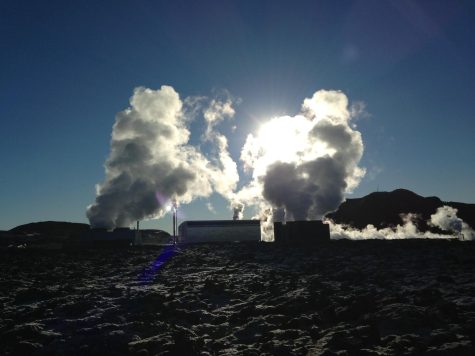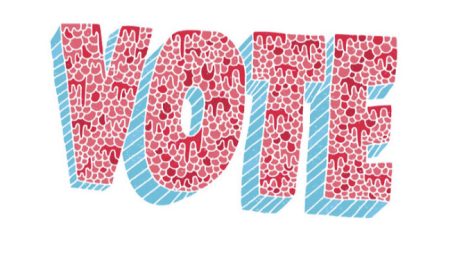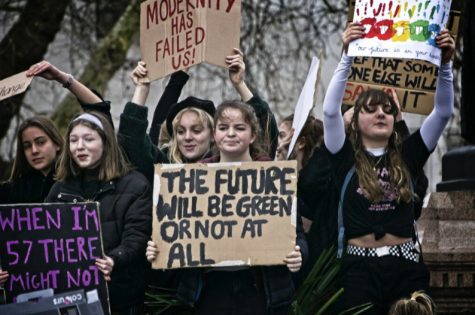Climate change: Why does our vote matter?
Imagine a long, thin road that winds its way into the horizon, past all the man-made houses, busy roads full of cars, and old, uneven brick walls. There at the end of the road, there is a gift from mother nature, a perfectly quiet land of beauty though surrounded by the utter chaos of modern life.
The gift contains water, trees, and clouds. The magnificent lake water looks very serene and transparent. The striking tall, skeletal tree reflecting off of the water. The exquisite puffy white clouds are back lit from the setting sun, causing them to look a radiant pink and yellow in the bright blue sky.
The breathtaking scenes that exist in our world today might not continue to exist for much longer if we don’t fight against the ticking clock of climate change. While there are many factors that contribute to how we deal with the situation, a major factor is how our politics interfere with how we deal with the changing environment.
Dr. Justus, an iSchool science teacher said “I think for those that value combating climate change, there’s a lot of great ideas, but not everyone currently values it for different reasons. And I think there’s a lot of wisdom and different spaces saying that we need to hear what everyone’s needs are and see how we can move forward in one direction as a country.”
What is climate change?
Climate change is a long-term change in normal regional weather patterns. Though climate change happens in specific ways within each region, the overall changes are global. Essentially climate change is not caused by only one factor; many complex factors contribute to this problem.
Some of these factors stem from the automobile industry, construction, and agriculture industry, which together release pollution into the atmosphere. The way these industries raise our food, heat and cool our buildings, and fuel our transportation release massive amounts of greenhouse gasses. These factors affect our planet and people. With climate change becoming more intense, the ramifications are increasing and becoming more dire every year.

Dr. Justus, an iSchool science teacher shares “that due to rising waters, many different people are being displaced. Due to the increased global temperature, We’re seeing more droughts and more natural disasters, and there was a recent UN report that reported that at the rate in which the planet is warming, we are going to be struggling with our ability to adapt to climate change if we don’t do more to prevent it from getting worse.”
The battleground of politics of climate change:

source:https://www.flickr.com/photos/chrispiascik/5139109756
As climate change becomes more of a major issue daily, there is an increasing need for political involvement. While there are some actions that individuals within society can take, the major power to make any major shift lies in the hands of the current world leaders.
The world’s politicians have contrasting views and opinions on the severity of climate change and how best to deal with it. This political disagreement for the past few decades has led to inaction and apathy in world leaders. Climate change hasn’t been on their agendas. This has led the government to underfund projects and organizations seeking to stop climate change and has forced them to rely on the public for funding.
According to Rebecca, a member of staff at the Pentagon, “executive order is key to get things working.” In order to do that, we must get climate change on the political agenda.
In order to get on the political agenda, climate change advocates need to be ready to take advantage of a policy window when it opens. The policy window is only open for a very limited time period, so if we miss the window then there would be little progress to find a resolution.
While the split between political views has caused drawbacks, the lack of public outcry has vastly impacted the progress. According to an excerpt of a Yale article, “theory says an issue is ‘most likely to reach the political agenda when three things occur at the same time: a problem is perceived as important and urgent by the public and elites [public will]; viable policy solutions are available; and political commitment to adopt a solution is high [political will].”
Why is government help so crucial? The government can offer jobs as well as funding to those fighting climate change. Guido, a GGS Environmental Consultant, worked on multiple projects where the government was immensely responsible for success.
The government helped with his Panama Canal extension project, beach replenishment project, and carbon capture project. Gudio shared, “ there are two things you need to implement these kinds of projects especially when they are on the community level: patience and persistence. You have to be patient because each government entity has their own agenda, their own mechanism, and their own time.”
In the past, the government has also made crucial steps, such as creating laws, amendments, and organizations. In 2012, as part of President Barack Obama’s commitment to an aggressive climate change policy, he created executive orders for cleaning up car exhausts. In 1990, the Clean Air Act amendments were passed by both houses of Congress. In the 1980s, when Ronald Reagan was president, the EPA created a trading program that would phase out leaded gasoline.
Selin, the VP of the Environmental and Social Risk Management (ESRM) team in New York at Morgan Stanley, states “globally and in the U.S., the regulatory conversation is already picking up on the link between climate-related risks and financial markets. Accordingly, we see a growing appetite for green financing opportunities, since climate change is not only viewed as a social issue, but also as a financial risk. We are always monitoring new developments and evolving regulatory frameworks on climate change to analyze their implication to our policy and procedures.”
While the government has made some essential steps to help climate change, the government has also not made a lot of progress in general and held back others. According to a Harvard article “politics of climate change have held back progress, in particular the once strict distinction between developed countries – which committed to cutting CO2 – and developing ones – which did not.”
The gold ticket solution:
There is no gold ticket solution, but there are things we can do to help, such as giving donations to organizations that will help like Peconic Land Trust, volunteering for nonprofits fighting climate change, saving energy at home, walking or taking public transportation, and perhaps most importantly voting for leaders that see climate change as a priority.
Josh, the Environmental Programs Manager at Peconic Land Trust shares “the Peconic land trust works with a lot of community members and local governments to protect as much land and water resources as possible.”
To achieve political progress, we must create public will. The way to help raise political and public will is to shift the societal mentality of “this is not my problem” to “this is everybody’s problem including my own.” This will help jump start the important action. According to an excerpt of a Yale article “This mental shift — from perceiving climate change as ‘their’ issue to ‘our’ and ultimately ‘my’ issue — helps build public will for policy action.”

It is dire for politicians and the people they represent to be on the same page regarding climate change, because without funding, international outreach, mandates, and legislation this is a battle we can not win.







